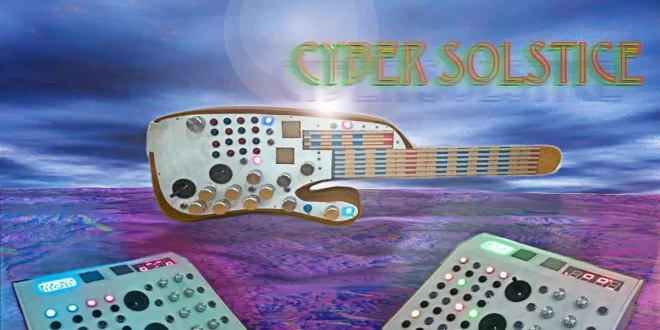
Musician, performer, and instrument builder Nick Demopoulos’ project Smomid relies on instruments he’s designed and constructed for his interactive computer music. He’s taken the name of the project from an acronym of his main instrument “String Modeling Midi Device” and has produced three full-length albums driven by Smomid and Pyramidi instruments. Demopoulos debuted with 2015’s Rhythms of Light and followed it with A Smoment in Time released in 2017. 2019’s Pyramidi Scheme achieved notable success, but 2022’s Cyber Solstice develops his project’s unique sound and songwriting further than ever before.
TWITTER: https://mobile.twitter.com/smomid/with_replies
Smomid’s music is a take it or leave it proposition. It is difficult to imagine any listeners feeling ambivalent about Demopoulos’ work. Its scattered rhythms, unconventional textures, and improvisational spirit subvert traditional songcraft yet there’s enough familiarity to keep the experience grounded in recognizable terrain. We aren’t completely cast off into alien territory with this music, but anyone expecting verse-chorus-verse should look elsewhere.
The challenges posed by Smomid are well worth the payoff. “Rhythms of Lyfe” opens the album at a constant simmer and its principal motif, the seeming human breath having for the bulk of the track, gives the song a distinctly human yet unsettling mood. “Geophilia” finds Smomid moving closer to traditional song structure. How his music approaches these traditions, however, is a different matter. The composition’s reliance on computer-generated accompaniment is clear and skews its melodic strengths towards the mechanical. It isn’t far removed from the early video soundtrack fare in terms of sound.
The idea may sound chintzy to some. The execution, however, creates a vivid new elaboration on what listeners typically expect from pop songcraft. Experimentation returns to the forefront, however, for the follow-up “Harmonic Wave Interference” as it comes off as something akin to free-form synth and computerized jazz with a careening vision of the possible. Traditional musical instruments are incorporated into the song such as woodwinds and their improbable presence gives the track an unexpected spin.
“Inceptionism—” opens with a flurry of dialtone-like digitized beats before settling into a melodic techno-driven groove. The catchy bass line loping through the cut’s beginning sticks with you. Smomid adheres to a relatively straightforward arrangement with this cut, it isn’t as busy as its predecessors, and he gives recurring motifs the right degree of variation. It’s oddly one of the album’s more “accessible” moments.
APPLE MUSIC: https://music.apple.com/us/album/cyber-solstice/1630558684
His arrangement for “Cr8tive De$truction” embodies the song title. There’s a leaning towards a sort of industrial techno in Smomid’s musical direction that blooms full flower in compositions such as this. “Remember to Remember” may have an elegiac and retrospective title but few other tracks on this release are as unrelentingly physical. The music’s physicality is all the more gripping given that Smomid cycles through an impressive array of moods over the track’s near ten-minute running time. It is the clear centerpiece of the release. Newcomers are forgiven for feeling an impulse to cut this project short but keep listening – and then listen again. Smomid’s Cyber Solstice reveals itself over time and with attention but, when you get it, you’ll want more.
Mark Druery
 IndieShark Music News, Reviews & Interviews
IndieShark Music News, Reviews & Interviews



